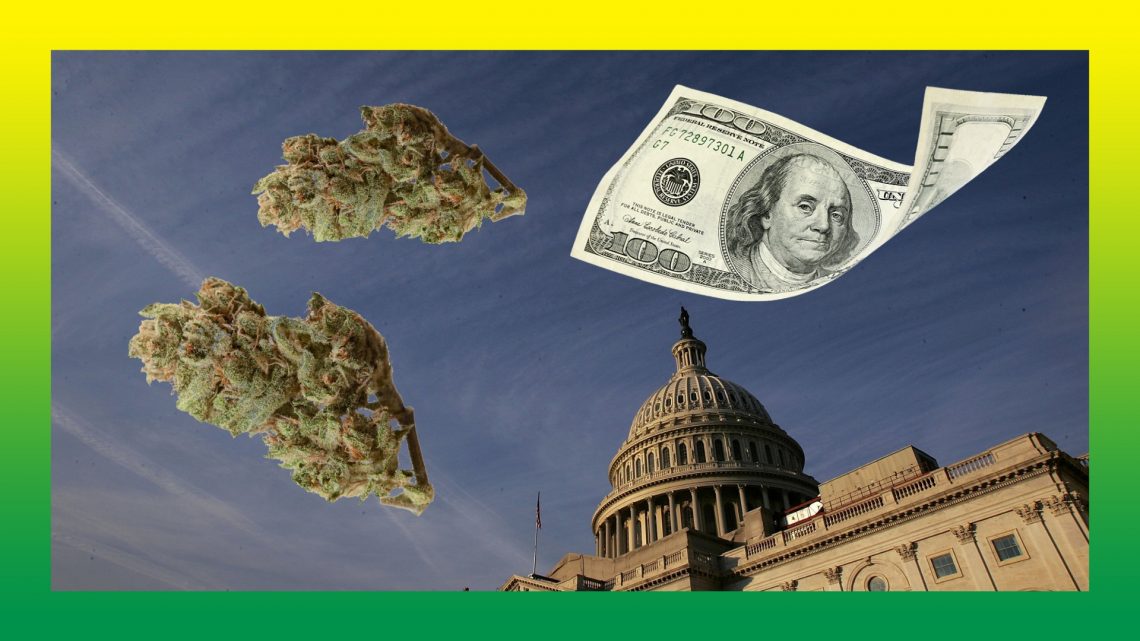
The Weed Industry Is Burning Millions on DC Lobbyists and Getting Nowhere
April 24, 2019 Off By Chris RobertsIn its quest to usher in a new world of legal profit where the global weed trade is no longer controlled by drug traffickers, the rapidly growing American cannabis industry is using a very old strategy: showering lobbyists with money and unleashing them on Congress.
In recent years, a growing number of recently formed cannabis trade groups have enlisted the services of former staffers for top Republicans and Democrats, now working at some of K Street’s most prominent lobbying firms, disclosure forms show. Cannabis lobbying groups are spending up to $60,000 a month apiece trying to win friends and persuade recalcitrant lawmakers to see their point of view.
The results, however, have been pretty paltry: Cannabis is still illegal nationwide, businesses still can’t bank or deduct expenses on their taxes like other merchants, and legitimate interstate cannabis commerce remains a distant dream. With few exceptions, bipartisan bills that would de-schedule the drug or give businesses tax relief are still withering in committee without hearings, let alone votes.
In other words, the new wave of spending hasn’t bought any results—even though President Donald Trump has reportedly said he’d sign a bill letting states freely legalize cannabis if Congress passes one, and even though Attorney General William Barr told Congress that he prefers cannabis reform to the current status quo.
Cannabis lobbyists point out that theirs is still a very young industry and the game in Washington is a long one. The first legal sale of commercial recreational cannabis was in January 2014, and even if an overwhelming majority of voters clearly want legalization, a corresponding shift in Congress will take time.
“We’re just doing what we’ve always done,” said Neal Levine, a former lobbyist with the legalization advocacy group Marijuana Policy Project who is now the executive director of the Cannabis Trade Federation (formerly named the “New Federalism Fund”).
In Washington, “we’re operating like every other industry out there,” hiring lobbyists with “subject-matter expertise” and the right connections, he added, “except that we’ve got federal issues that nobody else shares.”
But so far, several Hill veterans told VICE, all the cannabis industry has been able to buy in Washington is an expensive lesson in how the Capitol works—and how little cannabis matters compared to other well-established business interests burning cash in DC.
One problem is that cannabis industry lobbyists aren’t beloved by either side of the aisle, for different reasons. Despite cannabis’s potential in the marketplace, consistently estimated in the tens of billions of dollars, most weed-friendly lawmakers—nearly all of whom are Democrats—would rather meet with representatives from established legalization advocacy groups rather than hired guns on retainer from the for-profit industry. In key Congressional offices, the “suits” are greeted with deep suspicion and given a brush-off, several Hill staffers said.
And long-tenured Senate Republicans, whose support or at least neutrality will be required for any major cannabis reform bills to make it through Congress, are not meeting with anyone from the industry at all.
The response to lobbyists, no matter who they are, is “completely negative from Senate Republicans over the age of 65,” said one Hill veteran working on the issue. (Several sources contacted for this story requested anonymity in order to speak freely and not compromise their relationships on Capitol Hill.)
In a way, what’s going on in Washington mirrors results from cannabis lobbying efforts at the state level.
Up until recently, spreading money around at state legislatures rather than in DC was a smarter strategy for the cannabis industry. The effect of these payoffs can be seen in states like Illinois and Ohio, where a few very well capitalized companies enjoy limited competition for market space—and have made themselves attractive targets for hundred-million-dollar buyouts—thanks to state laws that cap the number of dispensaries and cultivation centers. And in Illinois, where new Governor J.B. Pritzker made a campaign promise to legalize cannabis, those companies are now lobbying state lawmakers to keep the cap in place.
But there is growing recognition among Democrats, especially Democrats of color, that the cannabis industry is about profits first. Promises of social justice and racial equity successfully used to sell legalization are now looked upon with suspicion as a hollow and cynical sales pitch.
“They thought we were going to trust that at the end of the day, these communities would be invested in. But that’s not something I want to trust,” New York State Assembly Leader Cheryl Peoples-Stokes, the first black woman to lead the state legislature, told the New York Times in March. Peoples-Stokes warned she and other lawmakers would only support legalization if such a bill guaranteed benefits for low-income communities of color. “If it’s not required in the statute, then it won’t happen,” she said.
Doubts about the industry’s commitment to social justice were deepened by ham-fisted attempts at power moves. Last year, the New York State Medical Cannabis Industry Association sent a memo to Governor Andrew Cuomo arguing New Yorkers shouldn’t be allowed to grow their own cannabis at home, unlike adults in other states.
Cuomo appeared to listen to the industry. The governor proposed banning home cultivation in his short-lived legalization proposal while promising that equity components, such as guaranteed benefits for drug-war victims, would come later. It was a blunder. As Peoples-Stokes promised, the industry-first, reparations-later proposal was abandoned for lack of support. Similar opposition recently blocked a legalization proposal in New Jersey.
While industry lobbying may yet grant cannabis businesses banking rights, including those few businesses owned by minorities, “we need to ensure that equity and social justice elements are included in ALL cannabis policy,” Shanita Penny, the president of the board of the Minority Cannabis Business Association, told VICE in an email.
Such sentiments are shared by members of Congress. As VICE News first reported, New Jersey Senator Cory Booker recently pulled his support from Elizabeth Warren’s STATES Act, which cannabis lobbying firms report spending much of their time advocating for, in favor of a social justice–centric bill called the Marijuana Justice Act.
Cosponsored by key cannabis-friendly lawmakers like Congresswoman Barbara Lee—who represents Oakland, California, one of the few jurisdictions that has an “equity” law—the bill is the first at the federal level that would require businesses to invest in black and brown communities devastated by the drug war that have thus far not enjoyed economic benefits under legalization.
This is putting the suits, for whom the STATES Act was the best thing going even as critics said it would largely preserve the inequalities in state cannabis law, in a difficult position. “If you poo-poo the Marijuana Justice Act, Barbara Lee is not going to want to talk to you,” one lobbyist said.
Traditional Republican-friendly talking points—jobs, states’ rights, libertarianism—also aren’t necessarily effective when it comes to selling cannabis bills.
"It took us a long time to get where we are,” said Justin Strekal, NORML’s Hill lobbyist. Strekal also pointed out that the “marijuana industry” doesn’t work as a metonym and is not as powerful as it might think. “There is no monolith of industry,” he said. “And ‘the industry,' writ large, pales in comparison to the economic power of the nail polish industry."
“It’s not like energy or healthcare or something like that,” said Michael Collins, a lobbyist with the Drug Policy Alliance who has been working on cannabis on Capitol Hill for six years. “What wins members [of Congress] over isn’t, ‘Hey, we’re creating jobs,’ or ‘Hey, we’re creating tax revenue.’ We’re not at that level yet. What wins the day on the Democratic side is social justice, and the industry doesn’t necessarily make that argument.”
Cannabis lobbyists are realizing that the advocacy bona fides enjoyed by social justice–oriented reform groups, like NORML and the George Soros-funded Drug Policy Alliance, actually mean something.
“The industry is spending millions on lobbying at the federal level, mostly on the banking issue,” said Dan Riffle, a former lobbyist with the Marijuana Policy Project who now serves as a senior policy advisor to New York Congresswoman Alexandria Ocasio-Cortez.
The industry spending easily eclipses what the traditional advocacy groups can spend, Riffle said, but “the industry is paying guys who don’t give a shit about this issue beyond the money, so they mostly don’t do anything.”
And yet the money keeps rolling in, with no sign of stopping.
According to lobbying disclosure records, a handful of cannabis trade groups spent $1.3 million lobbying Congress last year. Based on initial filings, spending in 2019 will easily surpass that amount.
In the past month, two new trade groups—the Global Alliance for Cannabis Commerce and the National Cannabis Roundtable—have filed registration papers. In addition to banking and tax reform, major cannabis businesses want to be able to ship vast oversupplies of cannabis from states suffering price crashes like Oregon to states like Louisiana, where medical weed is technically legal but not widely available.
Recently hired guns enlisted by the cannabis industry to woo their former bosses and colleagues include Nadeam Elshami, a former chief of staff for current House Speaker Nancy Pelosi, now at Brownstein Hyatt Farber Schreck, and David Schnittger, a former deputy chief of staff for ex-Speaker John Boehner now at Squire Patton Boggs, according to records.
Both of those firms consistently rank among the top revenue-generating lobbying outfits in Washington. And certain players in cannabis have shown no compunction about enlisting erstwhile enemies to help their cause. (Representatives from both firms who lobby on cannabis did not respond to phone messages and emails seeking comment.)
The most prominent flip-flopper on cannabis is almost certainly Boehner, a conservative who last year joined the board of Acreage Holdings, an upstart cannabis firm based in the US that Canadian juggernaut Canopy Growth Fund recently announced it planned to acquire.
Last fall, Boehner appeared on an infomercial for would-be players on the volatile stock market for cannabis. And as the the Hill reported earlier this year, Boehner, who joined Squire Patton Boggs, is also chairing the National Cannabis Roundtable and taking meetings with lawmakers on cannabis.
According to disclosure forms, NCR billed $45,000 through the first three months of 2019, all of it in support of the SAFE Banking Act, which would clarify that major financial institutions would not be forced to reject cannabis merchants’ business, meaning those merchants would be able to make deposits and pay taxes electronically or with checks instead of with massive piles of robbery-welcoming cash.
And despite the tobacco industry’s terrible reputation and the zeal of legalization advocates to distance cannabis from an addictive and deadly substance, one trade group—the Cannabis Trade Federation—earlier this year hired veteran tobacco industry lobbyist Cassie Folk as their vice president of federal policy. Folk’s past clients have included the National Confectioners Association and tobacco giant Reynolds American, according to disclosure filings and her LinkedIn profile.
Folk did not agree to an interview, but CTF’s Levine, who hired her, said that her addition “had nothing to do tobacco” but her entire resume. At the same time, “while our product is far different from tobacco, from a regulatory and a lobbying standpoint, there is a lot of subject-matter expertise that applies to our industry,” he allowed.
The hire is raising some eyebrows as it is part of a wider trend as well as an I told you so moment among old-school cannabis heads, for whom a tobacco industry takeover is an ancient and well-trod conspiracy theory—that is at least partially coming true.
In December, Altria Group, the parent company of Marlboro, made a $1.4 billion investment in Cronos, a Canadian marijuana company, while also quietly patenting dozens of devices that experts said could be used to vaporize cannabis. And in late 2016, before California, Nevada, Maine, and Massachusetts legalized recreational cannabis, Boehner joined Reynolds American’s board of directors.
"I don't think anyone is going to listen to the lobbyists."
Tobacco lobbyists are also not the best look in a Capitol Hill meeting with a social-justice-minded lawmaker, and thus perhaps a strategic blunder for the cannabis industry that’s also throwing money at former Hill staffers who can’t deliver and may not even be really trying.
"How much can the lobbyists actually do?” asked Matt Kumin, a California-based cannabis attorney who recently spoke at the Cannabis Dealmakers Summit. “We have so many people in so many positions of mainstream life saying, 'It's time to fix it.' I don't think anyone is going to listen to the lobbyists. It will be the governors, or the bankers, or the Chamber of Commerce,” he added. “Anyone taking money from people to go do something in Washington better be very clear with the client exactly what they think they can accomplish."
"Cannabis Trade Federation is funny,” another lobbyist said. “I used to think that they were the worst expenditure of money in policy in cannabis—since they are the functional equivalent of lighting money on fire—and then National Cannabis Roundtable came around."
If the industry is having an easier time getting meetings on Capitol Hill than before its spending flurry—and by most accounts from people VICE spoke to, it is—it’s not because of Republican connections or the money they are spending. It’s because the public is coming around. But as the industry struggles to translate that widespread support and success legalizing marijuana via ballot initiatives into concrete policy victories at the federal level, its big-spending approach is lining the pockets of K Street and, so far, not much else.
“You don't need 25 lobbyists,” one Hill veteran said. “You need six good lobbyists with resources, a solid shop, and a good strategy behind them." Until the cannabis industry grasps this reality, cannabis will be very good for Capitol Hill—but not necessarily vice versa.
Chris Roberts is a freelance reporter based in New York City.
Sign up for our newsletter to get the best of VICE delivered to your inbox daily.


